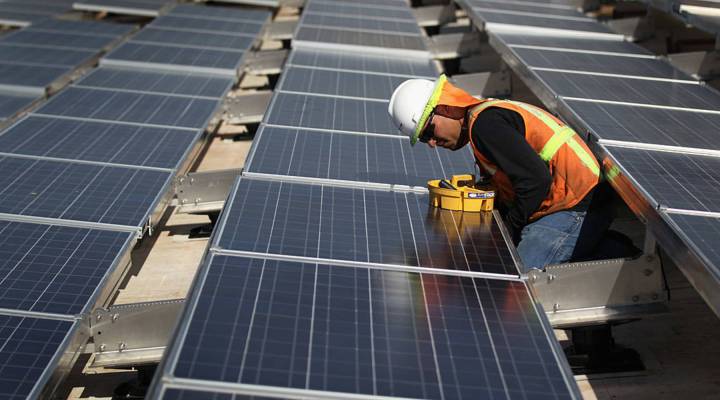
Solar tariffs request is dividing the industry

The Los Angeles office of Green Solar Technologies was humming on a recent Tuesday. In dozens of cubicles, sales people were working their phones, following up on sales pitches for solar systems.
Looking out through his large office windows, Edward Harner, chief operating officer of the company, didn’t focus on the mountains that were visible but on the houses spread out before him.
“You can see a couple solar installations in the view, and the only thing that I keep asking myself is, ‘Why is there not solar on every roof that I see, and why can’t we be the ones to give them solar?’” Harner said.
Most of the panels his company puts on rooftops come from SolarWorld, one of the largest manufacturers of solar panels in the United States. That’s a somewhat unique practice, because most of the solar panels on American houses these days are made overseas, many from China. The cheap price of foreign panels has made them so prevalent that some U.S. manufacturers say they can’t compete.
| Why two American billionaires are betting on renewable energy |
| The sun is rising on mandatory solar roofs |
| Does it matter if the US doesn’t lead on climate change policy? |
SolarWorld just joined a petition asking that the International Trade Commission effectively double the import tax on foreign-made panels. That petition was drawn up by another U.S. solar panel maker, Suniva, which has filed for bankruptcy. If their bid for an import tax works, other solar power companies — which sell not just panels, but all the services around them — could suffer.
“We consider this a significant risk to the solar industry,” said Timothy Fox, a vice president and research analyst at ClearView Energy Partners.
Fox said the price of solar equipment would at least double if the tariff is put into place. He said that increase in costs could lead to a decrease in installations.
That would slow down the entire sector, from consultants to installers, said Abigail Ross Hopper, president of the Solar Energy Industries Association.
“If the relief that this company has proposed is granted, we would lose approximately 88,000 jobs across the country,” Hopper said.
Tim Brightbill, an attorney representing SolarWorld, disagreed with such arguments, saying previous projections that tens of thousands of jobs would be lost when SolarWorld won earlier trade disputes never materialized.
“Instead, solar demand kept going up, prices stabilized to help manufacturing and solar jobs went up,” said Brightbill, with law firm Wiley Rein.
If the International Trade Commission sides with Suniva and SolarWorld, their petition will go to the White House. President Trump has signaled indifference to increased green energy production within the country. His desire for an increase in manufacturing jobs could align well with the two companies’ request.
Harner of Green Solar Technologies said his company’s business would be somewhat protected by its existing purchasing relationship with SolarWorld. He said only about 30 percent of the panels his company uses are foreign made.
“If the tariffs actually go up for imported panels, then we are going to be hurt less than others,” Harner said.
There’s a lot happening in the world. Through it all, Marketplace is here for you.
You rely on Marketplace to break down the world’s events and tell you how it affects you in a fact-based, approachable way. We rely on your financial support to keep making that possible.
Your donation today powers the independent journalism that you rely on. For just $5/month, you can help sustain Marketplace so we can keep reporting on the things that matter to you.












